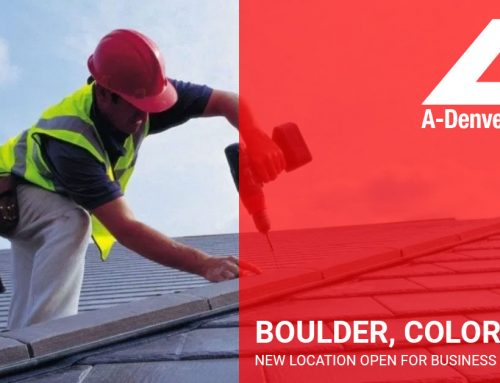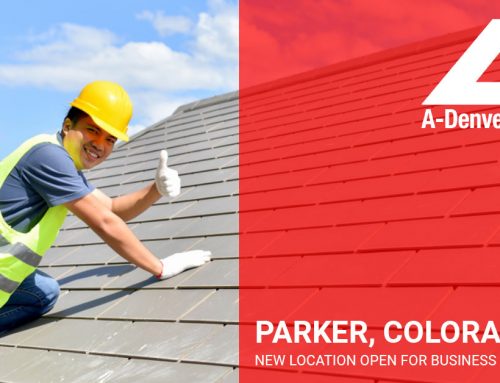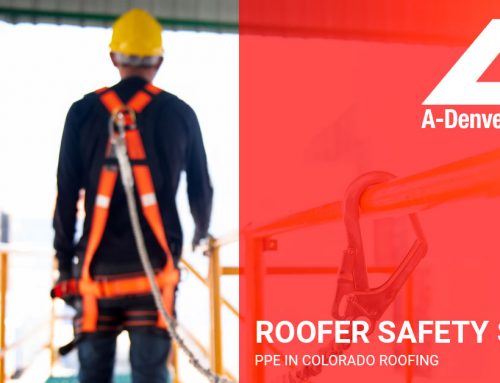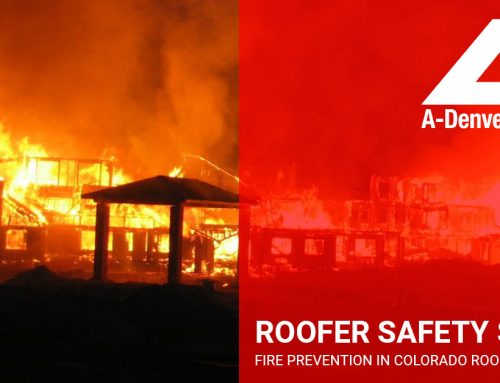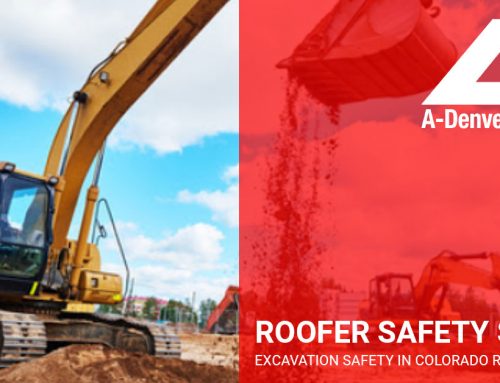What Is A Colorado High Wind Event?
All too often roofing decisions are made without sufficient consideration for the wind performance of the roofing system. However, A-Denver Roofing’s expert consultants guide each and every one of our clients in choosing the correct roofing system for their geographic location. A roofing system will truly be tested when it experiences multiple wind events over time in the most extreme weather conditions, such as occurs in Colorado’s extreme weather. The National Oceanic and Atmospheric Administration’s National Weather Service states that “a high wind event has occurred whenever sustained winds of 40 mph or more, or a peak gust of 58 mph or more, has been reported from reliable observing equipment.” Keep reading to learn how A-Denver Roofing will protect your commercial building from Colorado’s High Wind events.

SITUATION
As catastrophic hurricanes like Harvey, Irma, Maria and Florence have shown, the National Oceanic and Atmospheric Administration’s (NOAA) National Hurricane Center plays a critical role in protecting Americans by forecasting and tracking these massive storm systems. This Miami-based facility has to be functional at all times, even during a Category 5 hurricane. So when the building needed to replace its failing roof, it was crucial that the new roof be storm-proof and installed without disrupting the center’s operations.
RESULT
It was suggested that the existing built-up roof (BUR) be replaced with a Sarnafil G410 EnergySmart PVC membrane. As if on cue, weeks after the roof of the National Hurricane Center was completed, Hurricane Matthew slammed into Florida. Although the Category 5 hurricane had weakened to a tropical storm by the time it reached Miami, it was still a good indicator of the new roof’s performance. A-Denver Roofing is an approved applicator for this roofing system, and if this system is good enough for a hurricane, it’s dam sure good enough for Colorado.
PROJECTS WHERE A HIGH WIND SYSTEM SHOULD BE CONSIDERED:
High wind events are not just limited to those buildings that are located near the coastline or in tornado prone areas. Almost all of Colorado, Denver, and Colorado Springs should consider the following criteria when determining if your building should have a roof system designed to resist high wind loads.
• Building height of 70 feet or taller
• Location near any large body of water (coastal or inland)
• Located within hurricane prone areas
• A desire for long-term performance and complete security
EXPERIENCE YOU CAN RELY ON
You want to choose a Denver roofing contractor that has the experience to provide a roofing solution that will perform to your Colorado high wind performance needs. A-Denver Roofing’s roofing systems have stood the test of time in the harshest climates all over Colorado. Our experience with high wind roofing systems in such diverse locations as the Colorado Front Range to the Colorado Eastern Plains will provide you with the peace-of-mind that comes from working with an experienced commercial roofing contractor.
A-Denver Roofing’s roofing systems are widely recognized for exemplifying the highest standards of quality, reliability and watertight protection. Our record of proven performance is on display on buildings all over Colorado, in every imaginable climate. All told, we’ve installed more than 160 thousand square feet of thermoplastic roofing and waterproofing membrane since 1994.
HOT-AIR WELDED SEAMS AND FLASHINGS
Faulty seams are a common source of leaks in any roofing system. Some roofing membranes use sealants, adhesives or tapes to secure the seams, but because A-Denver Roofing’s membranes are thermoplastic, seams and flashings are welded together using an automatic hot-air welder. When welded together, the sheets of membrane become one monolithic layer of material impervious to water and moisture infiltration. This keeps your commercial building in Colorado leak-free for decades after our installation.
SITUATION
After Hurricane Irma devastated the Caribbean in the late summer of 2017, it set its sights on Florida. The storm’s large wind field resulted in strong winds across much of the state, with the highest recorded wind gust of 142 miles per hour observed in Naples. Large-scale retailer Target had three stores directly in the path where the storm was most severe.
RESULT
Luckily, many Target stores utilize Sika roofing systems, the same systems A-Denver Roofing installs all over Colorado. The three stores in Hurricane Irma’s path did not suffer any roof damage due directly to a wind uplift failure. Two of the stores were damaged by windblown debris, and the third store suffered a structural failure due to weight of standing water from a combination of several clogged drains and over-capacity of the storm sewer system. However, the roof membrane system stayed attached to the metal decking even in the collapsed area. Target was so happy with the watertight performance, they decided to replace the entire 17-year-old roof system with a new Sarnafil system.
Choosing a High Wind Roofing System for your commercial building in Colorado
Building configuration, location, existing roof condition and building codes all play a role in roofing system design. It’s important that you select the roofing system that matches your criteria. A-Denver Roofing offers a variety of high wind roofing systems to meet your specific needs in Denver and Colorado Springs. All three systems have FM, Florida Building Code and Miami-Dade approvals, which are the most stringent in the country.
A-Denver Roofing’s ENGINEERED ROOF SYSTEMS
The A-Denver Roofing Engineered Roof System is a mechanically attached system utilizing a unique termination bar to firmly attach our polyester scrim reinforced thermoplastic membrane to the deck. The Engineered System provides design flexibility and protection against Colorado’s high wind that no other roofing system in the industry is capable of. It is guaranteed to meet and exceed even the toughest of design criteria. The number of termination bars and fastener spacing will vary for each roofing application according to the custom uplift calculation that A-Denver Roofing’s consultants will determine based on your geographic location.
Our design consultants take into consideration wind uplift forces and fastener pullout values, since wind uplift on a roof can vary considerably depending on the location and height of a building.
A-Denver Roofing’s RhinoBond® ROOF SYSTEM
The innovative RhinoBond Roof System is used with PVC membranes to increase contractor productivity and enhance roof wind uplift resistance for the Colorado environment. It uses electromagnetic induction welding to eliminate fastener penetrations through the membrane, thus reducing membrane “flutter.” Specially coated membrane plates are fastened to the roof deck and later fused to the underside of the membrane using the RhinoBond tool, which is lightweight, portable and simple to use. RhinoBond is ideal for Denver and Colorado Springs projects that require enhanced wind protection. The system achieves an FM 1-120 rating while requiring 30 percent fewer fasteners per square, thereby saving our clients money, while simultaneously protecting their investments in Colorado.
A-Denver Roofing’s LIGHTWEIGHT INSULATED CONCRETE ROOF SYSTEM
Our Lightweight Insulated Concrete Roof System utilizes feltback fiberglass reinforced thermoplastic membrane adhered to lightweight insulated concrete using a water-based adhesive. Lightweight insulated concrete (LWIC) is a mixture of Portland cement, water and preformed foam. The LWIC can be applied over various types of substrates and decks. Expanded polystyrene is encapsulated within the lightweight concrete to add insulation value and enhance slope. The result is a lightweight (air dried weight of 26-38 PCF) substrate with a compressive strength of 120-300 PSI. The characteristics of LWIC make it an excellent substrate for adhering feltback membrane, resulting in a Colorado roofing system with high wind performance characteristics. LWIC can be utilized on both new construction and reroofing applications in Denver and Colorado Springs.

NO MATTER WHICH COLORADO ROOFING SYSTEM YOU CHOOSE, WE’VE GOT YOU COVERED.
PERIMETER EDGE DESIGN
Numerous studies have shown that failure of a roof’s edge metal is the most common cause of roof blow-offs. A-Denver Roofing offers and warrants three options to further protect the perimeter edge of your roof. Option 1 is a 25 gauge, galvanized metal sheet with a 20 mil PVC membrane film laminated on one side. It is a durable and attractive flashing product capable of being formed into a large variety of shapes and profiles. PVC flashing membrane is welded directly to the metal for maximum watertight protection at the roof edge. The edge metal is included in the system warranty and properly designed and installed can be warranted for wind speeds up to 120 mph, the perfect solution for Colorado’s high wind environment.
Edge Grip is a prefabricated perimeter edge attachment and fascia assembly comprised of three parts: the (base) rail, spring clips, and a snap-on fascia to provide labor savings during installation. Edge Grip’s unique design also provides aesthetic appeal, high corrosion resistance, and strong wind resistance. The rail is pre-punched to ensure consistent and secure fastener placement and prefabricated mitered inside and outside corners are used to ensure that the rail is positioned correctly. The snap-on fascia is held in place securely under tension applied by the spring clips, and is available in a wide range of colors, finishes and face heights to match your Colorado project requirements. A-Denver Roofing can earn warranties for Edge Grip for speeds up to 120 mph.
Edge Grip Extruded fascia system is designed to provide your Colorado roof system with maximum perimeter edge protection against Colorado’s high wind uplift. The system achieves pull-out resistance in excess of 540 lbs. per linear foot and is approved by FM, ANSI/SPRI and Miami-Dade to comply with the “High Velocity Hurricane Zone” of the Florida Building Code, the most stringent in the country. The prefabricated design provides labor savings during installation, aesthetic appeal with many color choices and high corrosion resistance. A-Denver Roofing can earn warranties for Edge Grip Extruded under the system warranty for wind speeds up to 120 mph.
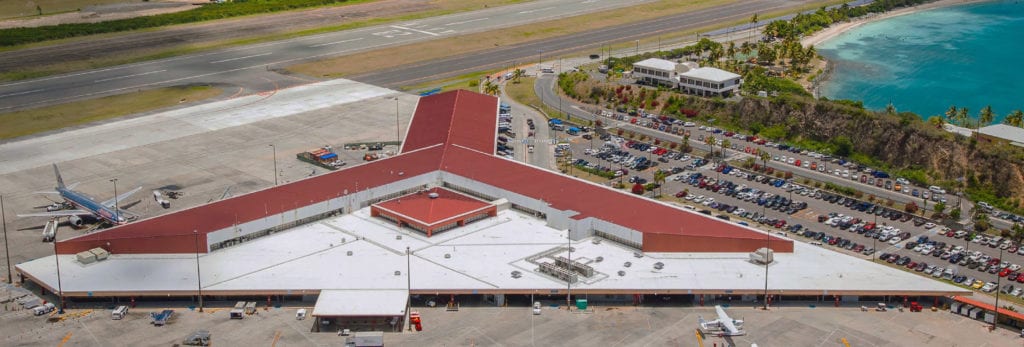
A-Denver Roofing’s project management process is the key to a successful installation. From specification assistance to installation, our “hands-on approach” is designed to make any project in Colorado a pain and hassle-free experience for our clients. Here’s how we help make the process go smoothly:
PROVEN MATERIALS
A high quality membrane is the key to any successful roofing or waterproofing project in Denver or Colorado Springs that demands absolute system integrity. With that in mind, A-Denver roofing uses only the highest quality materials to produce a monolithic, non-laminated membrane that offers unmatched durability and longevity.
EXPERT ASSISTANCE
Our skilled technical experts make A-Denver Roofing projects stand apart from other contractors in Denver and Colorado. We’re involved at each major milestone – offering design assistance to architects and specifiers as needed, reviewing construction documents, and training authorized applicators in the classroom and at the job site.
SKILLFUL WORKMANSHIP
We only hire a select group of trained, Authorized Applicators – only the best are invited to join our team. Maintaining strict control over the installation process means that quality is carried through from start to finish. Choose A-Denver Roofing for your next commercial reroofing project in Denver or Colorado Springs.


